You’ve likely seen Success Kid.
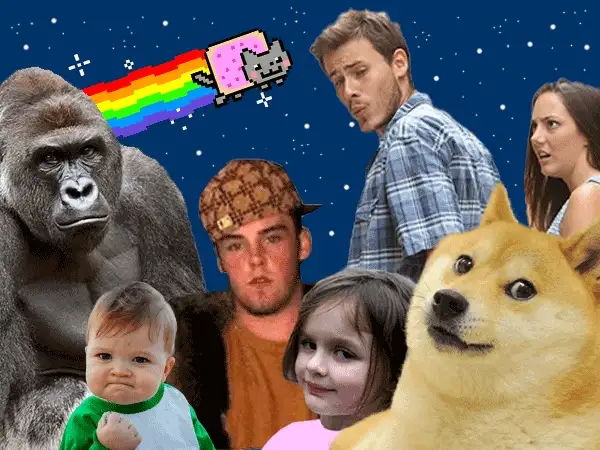
The image depicts a toddler smugly clenching his fist on a beach. In meme form, it’s typically overlaid with a caption describing an unexpected triumph like not getting spaghetti sauce on a white shirt, or finding a $20 bill in an old jacket.
It’s been shared tens of millions of times, and in endless variations, bringing collective joy to the internet.
But this past week, Success Kid was at the epicenter of a thoroughly humorless legal battle in an Iowa courtroom.
The drama began back in 2020, when a staff member for the far-right Iowa politician Steve King decided to use the Success Kid meme in a fundraising drive for his reelection campaign.
What King’s team failed to realize is that Success Kid is a copyrighted asset. They hadn’t secured permission to use it, or responded to a cease-and-desist letter.
This landed King in court, where he faced thousands of dollars in damages and a mountain of legal fees.

The photograph that is now known as the Success Kid meme (© Laney Griner)
Memes like Success Kid are so ubiquitous that we often think of them as a public utility.
According to one survey, the average millennial looks at 20-30 memes every day. On Instagram alone, some 365m of them are shared each year, often without credit.
Some internet users have assumed that a meme’s widespread virality entitles them to unrestricted use — including for personal gain.
But many of the internet’s favorite memes are lucrative commercial entities. And their owners occasionally take action to protect them.
The meme paradox
Success Kid and most other famous memes generally meet the three requirements to qualify for copyright protection in the US:
- An original work of authorship
- A minimal level of creativity
- Fixed in a tangible form of expression
Despite this, scholars have pointed out that the legal doctrine and meme culture are often at odds with one another:
- Copyright law is designed to prevent copying at all costs.
- Memes, conversely, depend on copying to achieve success.
A meme can only become a meme through untethered virality, which usually entails widespread copyright infringement.
“Memes are like organisms: They’re born, then proliferate across the internet with extreme speed,” says Don Caldwell, the editor-in-chief of Know Your Meme, a database of internet phenomena. “They need to replicate at scale to survive.”
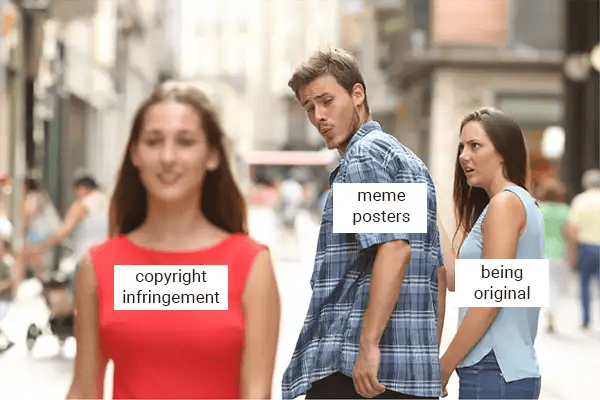
The Distracted Boyfriend meme (Underlying image via Antonio Guillem / Shutterstock)
As a result, memes exist in a legal gray area.
Though the originators of popular memes have the exclusive, monopolistic right to reproduce and distribute their work, they rarely choose to take action against random posters of memes on Reddit or Twitter who might technically be violating their copyright.
Take, for instance, the infamous Distracted Boyfriend meme.
Antonio Guillem, a Spanish stock photographer, snapped the shot in 2015 and licensed it through Shutterstock.
It was meme-ified by the internet around 2017 and has since been shared millions of times — sans credit. Despite the image’s immense popularity, Guillem says the image is only legally purchased and downloaded ~700 times per year.
“Each one of the people that use the [image] without the license are doing it illegally,” Guillem told PetaPixel. “This is not the thing that really worries us, as they are just a group of people doing it in good faith, and we are not going to take any action.”
Many legal scholars say that posting a dank meme on social media is protected under fair use. Most of these interactions have no financial motive and do more to help the meme thrive than hinder its market possibilities.
When someone shares or uses a meme with commercial intentions, it’s a different ballgame.
When meme creators sue
On a cloudy day in 2007, Laney Griner took her 11-month-old son, Sam, to a Florida beach and snapped a photo of him trying to eat a handful of sand. She uploaded the shot to Flickr and forgot about it.
But the internet found it — and Success Kid was born.
Over time, the photo spread widely, and not always in ways that Griner approved of. So, she registered a copyright and set out to protect her son’s image.
In 2015, Griner filed suit against Jake’s Fireworks, a company that was using the Success Kid image on the box of one of its products. The case was settled for unspecified financial damages, and Jake’s was forced to destroy its unsold inventory.
“[W]e’re not questioning the right of Internet users to use this,” said Griner’s attorney at the time. “This is more about a company making our client a de facto endorser of an age-inappropriate product.”
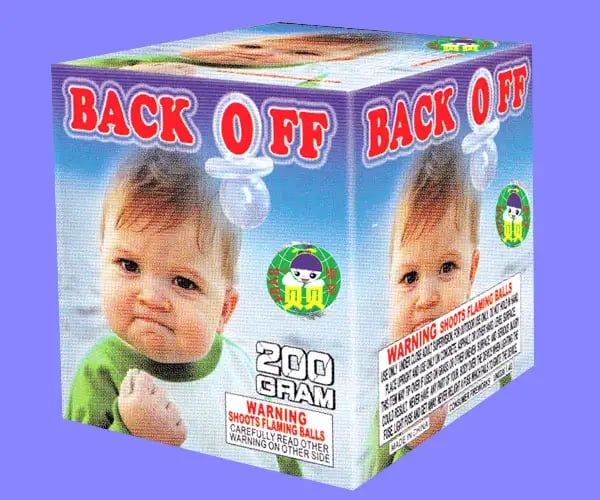
A pirated box of Back Off fireworks, featuring Success Kid’s likeness (Chinese fireworks website)
In recent years, a handful of similar meme-related lawsuits and infringement settlements have played out:
- The creators of Nyan Cat (a flying pixelated cat with the body of a Pop-Tart) and Keyboard Cat (a video of a ginger cat playing the keys) sued Warner Bros. and 5th Cell Media for using the images in a video game. The case was settled in their favor.
- The owner of Grumpy Cat (the famous scowling feline) sued the makers of Grumpy Cat Grumppuccino iced coffee drinks and won a settlement of $710k.
- The artist behind Pepe the Frog sued Infowars and Alex Jones for selling posters bearing the cartoon character. The case was settled for $15k in damages.
Kia Kamran, a copyright attorney in Los Angeles, has represented the creators of many of the most popular memes, including Grumpy Cat.
For him, the demarcation point between fair use and lawsuit is simple.
“When the general public is using a meme and it’s flourishing as a mode of expression, that’s OK. That’s the zeitgeist,” he says. “When a commercial entity is doing it to shill some service, we’re going after them — and we don’t lose sleep over it.”
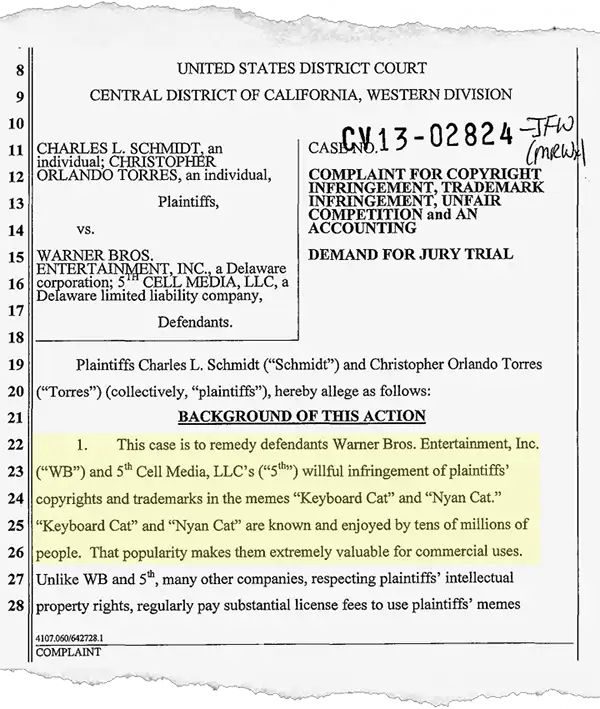
A 2013 lawsuit found that Warner Bros. and 5th Cell Media infringed the copyrights of the popular memes Nyan Cat and Keyboard Cat (court records)
Every now and then, there’s a case that skirts the line between free expression and commercial use.
In 2012, a tiny German blog named Get Digital published a short post celebrating its favorite meme: Socially Awkward Penguin, a photo of a penguin overlaid with captions about uncomfortable situations.
The post generated no likes or shares, and received minimal views. But three years later, Get Digital received a letter from Getty Images — the licensee of the penguin image in the meme — demanding ~$900.
The blog paid up, but not before releasing its own cartoon version of the penguin for anyone to use. “Enjoy sharing without paying any fees,” they wrote.
Kamran argues that copyright lawyers are often unfairly cast as “ambulance chasers,” and says that being punitive isn’t typically very lucrative for meme creators.
Even in extreme cases, damages rarely exceed $150k. That’s typically not even enough to cover legal expenses: The American Intellectual Property Law Association places the average cost of litigating a copyright infringement case in federal court at $278k.
But luckily, meme creators have a much more promising stream of revenue.
“The money’s not in suing people,” says Kamran. “It’s in licensing.”
The economics of a hit meme
Success Kid is managed by Ben Lashes (real name: Ben Clark), the world’s preeminent “meme talent agent.”
The 44-year-old ex-musician helps creators of viral content “protect, brand, monetize, and stay cool forever.” His roster of clients includes a large chunk of the internet’s most famous memes:
- Grumpy Cat
- Keyboard Cat
- Nyan Cat
- Disaster Girl
- Doge
- Ridiculously Photogenic Guy
- Harambe the Gorilla
- Dancing Baby
- Coffin Dance
- Leeroy Jenkins
- The Dress
- Scumbag Steve
- Ermahgerd
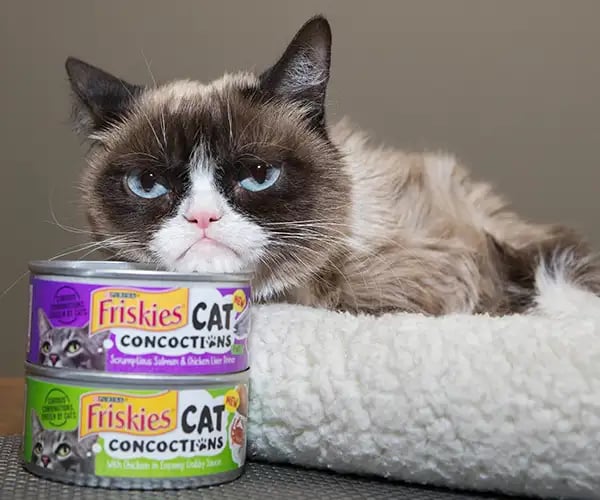
Lashes has been credited with turning Grumpy into a “rock star” with dozens of licensing deals, including a 6-year stint as the face of Friskies cat food (Suzanne Cordeiro/Corbis via Getty Images)
Lashes got his start in 2009, when a family friend named Charles Schmidt sought his advice. Schmidt’s “Keyboard Cat” video — first recorded in 1984, and uploaded to YouTube in 2007 — was going viral, and he had no idea what to do about it.
“I said, ‘Wow, you must be rolling in the dough,’” recalls Lashes. “And he said, ‘What dough?’”
At the time, nobody was monetizing memes. But with Lashes’ help, Keyboard Cat became a copyrighted asset and established licensing deals with brands like Delta, Starburst, and Wonderful Pistachios, which paid $150k+ to use the cat in a series of advertisements.
Lashes quit his day job, launched the meme management firm A Weird Movie, and signed on other creators of famous memes.
With the legal help of Kamran (“the world’s first meme lawyer”), he’s secured tens of millions of dollars in licensing deals for his clients:
- He turned Grumpy Cat into a household name, ushering the feline into lucrative partnerships with publishers, movie producers, and major brands (Cheerios, McDonald’s, Friskies). The cat’s owner, a former Red Lobster waiter, has reportedly made $100m from these deals — though she has claimed that number is high.
- He got Nyan Cat onto T-shirts at major retail stores, plush toys at Toys R Us, and art galleries.
- He’s facilitated ~$10m in meme NFT sales.
Over the past year, some meme creators have seen huge windfalls from the once-bustling NFT market. Among the notable sales:
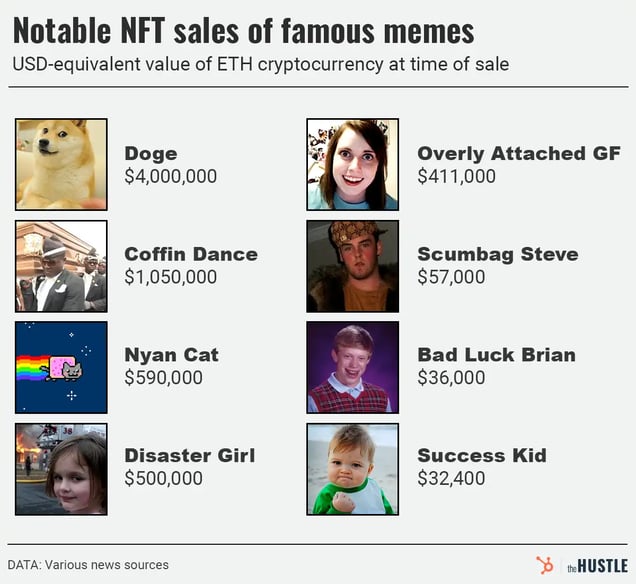
Zachary Crockett / The Hustle
Success Kid has seen its own share of action.
Since snapping that impromptu photo of her son in 2007, Laney Griner has inked deals with Coca-Cola, Microsoft, Vitamin Water, General Mills, Marriott Hotels, Bell Canada, and Medicare.
This past Thursday, she added one more paying ‘client’ to that list: Steve King, the politician from Iowa.
Though the jury determined that King was not personally liable in the case, it found that his campaign team, King for Congress, had engaged in unwillful copyright infringement.
The campaign was ordered to pay $750 in damages.
